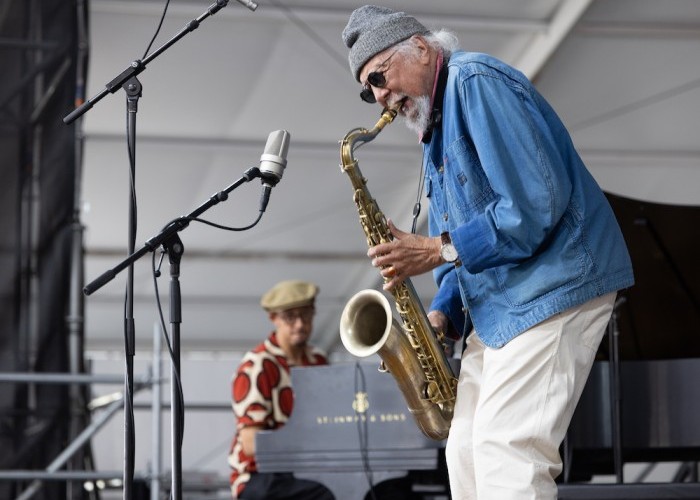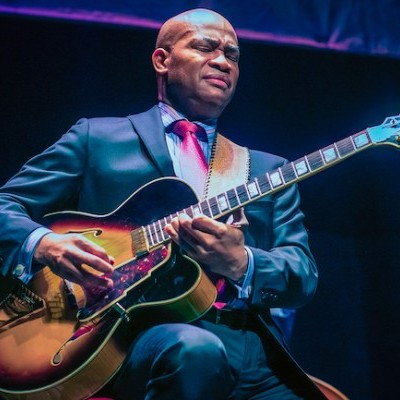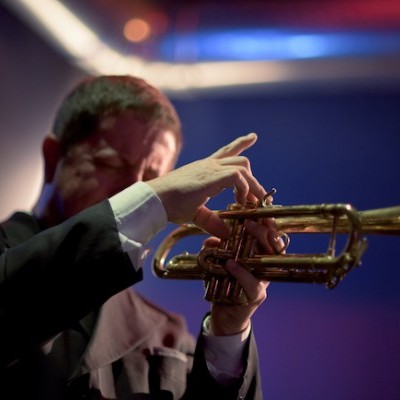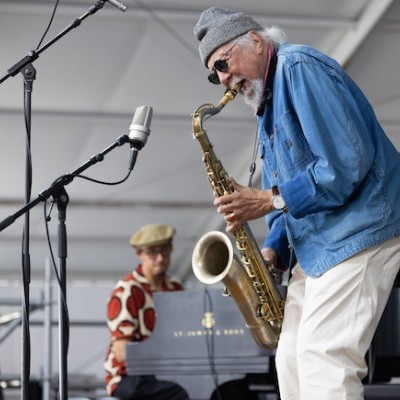Aug 7, 2024 2:02 PM
Snarky Puppy’s Shaun Martin Dies at 45
Shaun Martin, a multifaceted, Grammy-winning pianist, keyboardist and producer who was best known for his work in the…

“I don’t focus on the harshness of the music business,” Lloyd says. “I focus on the profundity of what we’re doing because that’s the real stuff. You can change the world with that.”
(Photo: Douglas Mason)“To get this honor at this late stage, I suppose I’m blessed. I just know that this is a sacred song, and I’m in service, and this is my humble offering to the planet. I play for the creator, and when it reaches me and he informs me and it can touch others, this recording …”
Charles Lloyd, at the age of 86, speaks with humor and humility and in unbroken, elliptical runs. At times, he tends to add in a self-amused chuckle. Responding to a query about the sudden news of his sweep of DownBeat’s top Critics Poll awards — an occurrence that’s never happened in the magazine’s 90-year run — he admits being happy about the news, but also a bit challenged to help explain it. Why now? What about all the other great years and recordings he’s made?
“I don’t have the answer for you. It came when it came. Time eludes me. I went into the ‘now’ many decades ago, and I just live in there, and I don’t know the phases of the moon or how history and all of that stuff works. I just know that I love the creator, and I love the music, and it’s been my sustenance all of my life. It’s on your desk [to write this article], and I pray that you can help this little kid from Memphis to be understood.”
It’s early June and the votes submitted for the magazine’s 2024 Critics Poll have just been tabulated, revealing that Lloyd clinched four top awards: Jazz Artist of the Year, Tenor Saxophonist of the Year, Jazz Album of the Year (for his long-awaited, post-pandemic statement The Sky Will Still Be There Tomorrow on Blue Note) and induction into the DownBeat Hall of Fame. This cross-category grand slam is a historic first for the magazine, and a singular feat for any artist, at any point in their career: all attesting to a rare convergence of legendary stature and continuing musical beauty.
None of this should surprise. Lloyd’s long proven himself a groundbreaker. In 1967 alone, the year he won his first DownBeat award for Artist of the Year, he was one of the initial jazz performers to establish himself with counterculture audiences, playing San Francisco’s Fillmore Auditorium. That same year, he became one of the first jazz musicians to sell a million albums (for Forest Flower, Atlantic) and arguably the first modern jazz artist to perform behind the Iron Curtain, which yielded Charles Lloyd In The Soviet Union (Atlantic, 1970). His trailblazing impact continued into the ’70s and up to the present day — freely collaborating with musicians from the rock world (the Doors, the Byrds, the Grateful Dead, the Beach Boys and, more recently, Lucinda Williams) and embracing ideas and concepts and opportunities to perform with musicians from distant cultures (Nigerian percussionist Babatunde Olatunji, Greek singer Maria Farantouri). To this day, Lloyd keeps a Hungarian tárogáto and Tibetan oboe alongside the saxophones and flutes in his creative arsenal.
Many are the chapters in Lloyd’s story: his start in Memphis, where he benefited from the same music program at Manassas High School that helped bring forth such jazz masters as George Coleman, Frank Strozier, Harold Mabern and Booker Little. His development in Los Angeles of the late ’50s, playing with Billy Higgins, Don Cherry, Ornette Coleman, Scott LaFaro and Eric Dolphy. He served in bands led by Chico Hamilton and later Cannonball Adderley, eventually moved to New York City, where he stepped out as bandleader in 1964 with his release of Discovery on Columbia Records and Of Course Of Course in 1965. His quartet with pianist Keith Jarrett, bassist Cecil McBee and drummer Jack DeJohnette came together soon after with the release of Dream Weaver on Atlantic Records.
Setting history aside: Lloyd’s four DownBeat awards were earned for what he’s doing now. The Artist of the Year distinction is, by itself, an achievement that doesn’t come to a musician resting on laurels or in the backyard napping. It’s bestowed on a musician with a full schedule of projects and touring, which accurately describes Lloyd since pandemic restrictions were lifted.
Even during lockdown, Lloyd pursued recording sessions, the results appearing on the three-volume Trio series released by Blue Note in 2022. Lately, he’s been touring as much as popular musicians half his age, headlining festivals and filling theaters, playing tenor saxophone and flute, and he still fronts a range of different ensembles: the exotic, rhythmically propulsive Sangam trio with Zakir Hussain and Eric Harland; his category-busting group The Marvels with Bill Frisell and Greg Leisz (notably, singer Lucinda Williams has not been part of this ensemble while focusing on her own touring); his guitar-and-piano trio Ocean II with Marvin Sewell and Gerald Clayton (at times with Jakob Bro adding second guitar).
Then there’s Lloyd’s mainstay quartet with its rotating rhythm section: Clayton or Jason Moran at the piano; Reuben Rogers or Larry Grenadier on bass; and Eric Harland, Kendrick Scott, Marcus Gilmore or Brian Blade on drums. (A slight return to the historic overview: Lloyd’s ability to attract top-tier talent into his groups has been unerringly consistent through his career — and continues. Notably, these musicians tend to make themselves available when called on, even though they are headliners in their own right.)
Recent well-attended performances featuring Lloyd’s quartet configuration — at Big Ears Festival in Knoxville, Tennessee, in March, at the New Orleans Jazz & Heritage Festival presented by Shell in April — were stunning examples of the ethereal/rootsy mix Lloyd still delivers so masterfully, so effortlessly. His shamanistic prowess has yet to flag. His ability to pull in crowds who could be elsewhere, attending to louder, more boisterous fare, still serves as one of strongest arguments that authentic jazz expression is an inherently spiritual act.
Onstage in New Orleans, Lloyd traded between his tender-toned tenor, tilted sideways as a nod to his hero Lester Young, and his flute, delivering lines as if sculpting with smoke, the quartet’s sound flowing with a conversational rhythm and ease. His setlist balances new material — “Defiant, Tender Warrior” and “Monk’s Dance” from the new album — with older, familiar tunes like “The Water Is Wide” and “Forest Flower.” There’s a reductive beauty in his music, a marked feel of distillation — nothing superfluous, just what’s needed. As a bandleader, Lloyd hardly speaks, favoring minimal statement or gesture, initiating tunes and stepping into solos, and leaving generous room for the other players to explore and express. In between his improvisations, he takes a seat next to the piano, listening intently, glancing up and smiling intermittently, conserving his energy — as well he should.
Of late, Lloyd has had a run of health challenges, including abdominal surgery in 2017, an unexpected bout with sepsis in ’22 that hospitalized him for two weeks, and now, an ongoing battle with prostate cancer requiring radiation therapy. Lloyd is acutely aware how precarious things can be at his age. “I’ve got mileage now and something always comes around and visits. I don’t know when the creator will call me home, I just keep trying to go forward.” (“I believe we caught it early enough to knock it out,” adds Dorothy Darr, Lloyd’s longtime companion and de facto tour manager, about the most recent scare.)
Before his New Orleans Jazzfest performance, Lloyd participated in a rare pre-concert interview, curling his lanky frame into a fold-up chair on the festival’s talk stage, and opened himself to questions from this journalist and a few festival attendees. The remainder of this article features words spoken by Lloyd at that event.
Asked about the “circle of musicians who have passed through his lineups — talk about A-teams!” — he smiles and answers: “All my life, I always loved a certain sort of chemistry that would fit with what I was dreaming of — it’s been a lifelong quest to have this ineffable sort of communion with fellow artists to go up to the hyperions with me. I mean the band with Keith and Cecil and Jack, you know, we were youngsters on a mission. But it took me so long to mature. ... I still go forward with that idea, and if you look back at my history, the people that have made music with me, I’ve been blessed.”
What criteria does Lloyd use in choosing bandmates? Does he prioritize a stylistic or generational perspective? “No.” The door’s wide open? “Right.” What about the communion of Moran, Grenadier and Blade, whose contributions distinguish his latest recording, The Sky Will Still Be There Tomorrow?
“Three years ago, just before COVID hit, I had this naïve notion that I could bring some tenderness into the world, and these great artists were the ones that I want to serve this mission with me — Jason, Larry and Brian. So we sent out the call and it came back affirmative, and it took a while to get us all together because of our schedules. And it was very beautiful and very magical. … But this idea of tenderness to the world, I’ve always been like that, you know. Thanks to those who listened or took home this music.”
One query can inspire Lloyd to speak through a range of topics, one streaming into the next, guided by its own logic. The comment that the Jazzfest date was the first of a multi-week tour leads him to mention how his routing now includes recovery days before he performs.
“I have to get in really early so I can try to acclimate and be rested. But traveling, I’m not big on it. I’m not able to keep a balance all the time, but Dorothy manages things and she blesses my life and makes the thing work.”
Lloyd mentions his first and best-known hiatus when, through most of the 1970s, not long after meeting his soulmate Darr, he disappeared from the jazz scene and returned to California. “I went back to the beach to heal from unprescribed medications and all that stuff I had fallen into. Dorothy and I went to the West Coast, and we made a simple life — simple living and high thinking.”
Lloyd recalls how, in the late ’90s, he considered giving up touring, but a fellow musician would hear none of it. Some 25 years later, he still feels the sting of that disapproval.
“I was always thinking about pulling the bridge up, you know, and staying in meditation and living a simple life. I told Master [Billy] Higgins when he showed up at our place in Santa Barbara, before he left town in 2001, I told him I had been fasting for a couple of weeks, thinking and meditating, and I said, no one cares about this music, so I’m going to go back into the forest. He looked at me and said, ‘Fuck them. We care.’ Then we recorded Which Way Is East [ECM, 2004]. Master Higgins gave me such a strong rebuke that I renewed and reupped my dedication, because these masters who come before me, they bring this wisdom of integration of life. It’s not for me to decide when it’s time to pull up the bridge.”
Higgins and Lloyd first grew tight in the mid-’50s, when the two of them fell under the spell of another master Lloyd often mentions.
“Master Higgins told me that one day he and Don Cherry were playing stickball out in the streets in Watts, and they heard this sound from far away and they dropped their procedure and began to run to it. They were musicians by then, but still kids, running to this music store, and it was Ornette [Coleman] trying out a reed!
“Ornette and I became very great friends. When I first got to L.A. in ’56, I was going to USC, and I saw a sign about a Sunday afternoon jam session in the window of a club called the Stadium Club on Vermont Avenue. And so I go, and you know I’m prepared. I was an 18-year-old kid from Memphis. I didn’t know anyone. They wouldn’t let me play right away, and I had to wait all day. But there was this eccentric guy with a homemade outfit and suspenders. I’m observing all of this. The song they were playing was “What Is This Thing Called Love,” but he didn’t play the song. He didn’t entertain the changes. He just played the etymology of love, and then they invited him off the bandstand.
“At the end of the evening, they finally let me play and it was acceptable. [laughs] I was playing alto at the time. Ornette came up to me afterwards and said, ‘You know you can really play the saxophone, but that doesn’t have much to do with music.’ It wasn’t harsh, it was just like he was saying it as it was. He was eight years my senior. Anyway, long story short, he won me over. We began to become friends and go back and forth to each other’s houses and have conversations about the music. There are many other guys I met in L.A., of course. Don and Billy and others. Ornette had a very beautiful thought. He’d say, if you can have a group of people that believe in an ideal, then you can go forward in the world and nothing can stop you — believers, yeah.”
Lloyd loves to speak of the legends in his personal pantheon. His latest album features tributes to three favorites: Billie Holiday, Thelonious Monk and his old classmate, trumpeter Booker Little. As part of the discussion, he selected three tracks to play: Little’s “Moods In Free Time,” Monk’s “I Surrender, Dear” and Holiday’s “I’ll Be Seeing You.” He explains his last selection as a token of an early infatuation. “I heard Lady Day on the radio when I was 8 or 9 and fell in love with her, and I had this naïve notion that I wanted to marry her and take care of her and give her the long, winding driveway. I couldn’t reach the clutch pedal yet. Big dreams like that, but I didn’t get to New York in time.”
Another question comes up: After the three trio albums, and this current quartet album, what’s next — what haven’t you done yet? “Oh, man, there’s so much to do,” Lloyd says wistfully and pauses. What’s on the top of the list?
“Geri Allen and I are having this conversation. Do you know Geri Allen? [to the audience] Anyone know her? She’s unsung — definitely not sung enough. The album Jumping The Creek [ECM, 2005], that’s a real special one that I did with her. You should check it out if you don’t know it. I’m trying to make an homage to her, so I’m listening to my [recorded] archives, and God bless Dorothy because she’s also a sound technician and captures all the concerts we do.
“Geri first came to me one time when I was playing in New York at the Knitting Factory and got in my face and said, ‘I need to play with you.’ It was so darn sincere and deep, you know. I said, ‘Well, OK. Welcome.’ So we began to play together in a quartet with Eric Harland and different bass players. I remember I’d be here onstage and she’d be over there right into Eric’s zone, and they would be in communion. We couldn’t see each other, so I said, Geri, when you play you look at the rhythm section so intensely. How do you communicate with me? She said, Charles — it’s all sonic. [laughs] I love her, you know. I didn’t do enough recording with her. That’s what’s on my plate right now.”
A Boston DJ in attendance asks: “You’ve talked about the beauty and profundity of music, but the music industry is not that. It’s ugly and vicious sometimes. How have you navigated that through your 51 albums?”
“I’m a reluctant bride, so I don’t navigate it well at all. As a young man, Booker [Little] pulled my coat and told me being in the music world was about character, and after Booker left, I did jump into the fast lane but I got run over by all those big Mack trucks and stuff. I didn’t like the plantation mentality that they possessed in the music industry. That’s why I went away at the end of the ’60s. But now I don’t focus on the harshness of the music business. I focus on the profundity of what we’re doing because that’s the real stuff. You can change the world with that. I haven’t done it yet, but I’m still naïve enough to hold the dream. You said I’ve got over 50 records — I had no idea of that. Thank you, sir.”
Another question, from a festivalgoer visiting from Santa Cruz: “Can you speak about your connection with Bill Frisell and Lucinda Williams, and recording “Angel” with her, a Jimi Hendrix song?”
“I can. Bill Frisell and Greg Leisz introduced me to Lucinda. But before that, Allison, our [Santa Barbara] neighbor, played her Car Wheels On A Gravel Road [Mercury, 1998] record for me, and it knocked me out. So profound and beautiful. Then I met Lucinda at one of my concerts and we were playing “Masters Of War,” and that kind of blew her away. She and I are both Southern, so we met in that place.
“We were in the studio recording, and there was no discussion about any financial thing involved, which I liked. She had some songs she wanted to sing on the album for Blue Note, and Don Was was producing. He’s a great sage and storyteller. He says he heard us in Detroit in the ’60s when he was a young teenager, and was touched by it. He says he asked Keith Jarrett, how much do you practice? Keith told him, ‘I don’t practice.’ We didn’t! We practiced on the bandstand every night for years.
“But I want to tell you about ‘Angel.’ So we had finished the sessions and everybody had gone home. It was just Bill and me and Don in the booth, and Lucinda kept saying [she] wanted to sing ‘Angel.’ So Don put up one microphone and we all stood around that one mic and just all played into it — one take. If you ever get to hear it, it’s something.”
Lloyd has to get to the WWOZ Jazz Tent to do a line check and then perform. But he has a need to tell one more story.
“When I was a little boy, I told my mom I wanted to play music. She told me, ‘I don’t care what you be, just be the best at it that you can be.’ We had a large house in Memphis and some famous people stayed with us — like Duke [Elllington]. So she said to Duke, my son wants to be a musician. He said, no, have him be a doctor, lawyer, Indian chief. This life is too hard. He didn’t know I was already bitten by the cobra. Years later he heard me in France with Keith and Jack and Cecil. He said, ‘Well, if he keeps stirring that soup, he’s going to have something!’ [laughs] Not knowing I was a little kid, he tried to dissuade, you know.
“Here’s what’s going on with me. I’m not trying to be mysterious about it. My mother wasn’t home when I was a little kid, and I would get real lonely. That’s what you’re hearing up there. I’m shy of folks, and I can be reluctant. Fortunately, Dorothy came and saved my life.” He then asks pointedly — “Are you going to play the Lady Day?” — and turns to the audience. “Thank you for coming. Please listen to this song.”
And that voice, another that touches hearts, generation after generation, begins to sing: “I’ll be seeing you/In all the old familiar places/That this heart of mine embraces/All day through …” DB

In addition to his work with Snarky Puppy, Martin freelanced as a keyboardist, producer and music director with prominent gospel and R&B musicians.
Aug 7, 2024 2:02 PM
Shaun Martin, a multifaceted, Grammy-winning pianist, keyboardist and producer who was best known for his work in the…

In addition to his instrumental prowess, Malone was praised for his musical generosity and his singular sense of humor.
Aug 27, 2024 12:09 PM
Guitarist and bandleader Russell Malone died Aug. 23, while on tour in Japan, after battling end-stage kidney failure.…

Jim Rotondi was acclaimed for his wide, round trumpet tone, remarkable virtuosity and assured swing.
Jul 9, 2024 11:35 AM
Jim Rotondi, a renowned hard-bop trumpeter, composer and educator, died suddenly on July 7 at a hospital in France. He…

Charles Lloyd, seen here at the 2024 New Orleans Jazz & Heritage Festival, makes DownBeat Poll history!
Jul 11, 2024 12:23 PM
The incomparable Charles Lloyd swept the 72nd Annual DownBeat Critics Poll, becoming the first artist ever to earn…
“Nicholas Payton is brilliant,” Tim Warfield said during his live Blindfold Test at Temple University. “He’s never ceased to surprise or amaze me. He’s a bad dude.”
Jul 9, 2024 11:36 AM
Saxophonist Tim Warfield doesn’t actually hail from Philadelphia — his roots are a couple of hours west, in York,…